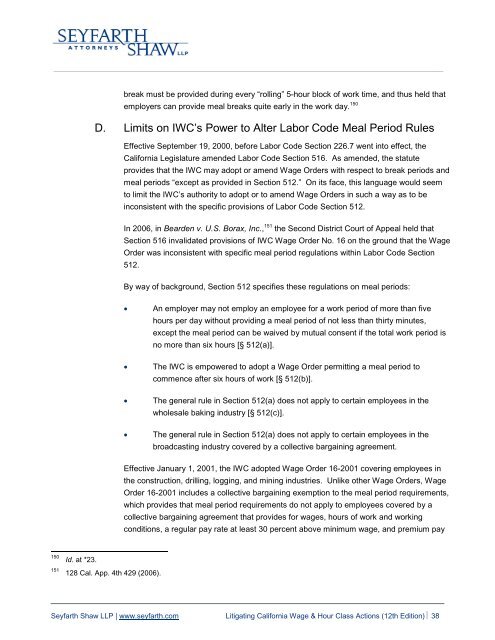Litigating California Wage & Hour and Labor Code Class Actions
Litigating California Wage & Hour and Labor Code Class Actions
Litigating California Wage & Hour and Labor Code Class Actions
Create successful ePaper yourself
Turn your PDF publications into a flip-book with our unique Google optimized e-Paper software.
eak must be provided during every “rolling” 5-hour block of work time, <strong>and</strong> thus held that<br />
employers can provide meal breaks quite early in the work day. 150<br />
D. Limits on IWC’s Power to Alter <strong>Labor</strong> <strong>Code</strong> Meal Period Rules<br />
Effective September 19, 2000, before <strong>Labor</strong> <strong>Code</strong> Section 226.7 went into effect, the<br />
<strong>California</strong> Legislature amended <strong>Labor</strong> <strong>Code</strong> Section 516. As amended, the statute<br />
provides that the IWC may adopt or amend <strong>Wage</strong> Orders with respect to break periods <strong>and</strong><br />
meal periods “except as provided in Section 512.” On its face, this language would seem<br />
to limit the IWC’s authority to adopt or to amend <strong>Wage</strong> Orders in such a way as to be<br />
inconsistent with the specific provisions of <strong>Labor</strong> <strong>Code</strong> Section 512.<br />
In 2006, in Bearden v. U.S. Borax, Inc., 151 the Second District Court of Appeal held that<br />
Section 516 invalidated provisions of IWC <strong>Wage</strong> Order No. 16 on the ground that the <strong>Wage</strong><br />
Order was inconsistent with specific meal period regulations within <strong>Labor</strong> <strong>Code</strong> Section<br />
512.<br />
By way of background, Section 512 specifies these regulations on meal periods:<br />
<br />
<br />
<br />
<br />
An employer may not employ an employee for a work period of more than five<br />
hours per day without providing a meal period of not less than thirty minutes,<br />
except the meal period can be waived by mutual consent if the total work period is<br />
no more than six hours [§ 512(a)].<br />
The IWC is empowered to adopt a <strong>Wage</strong> Order permitting a meal period to<br />
commence after six hours of work [§ 512(b)].<br />
The general rule in Section 512(a) does not apply to certain employees in the<br />
wholesale baking industry [§ 512(c)].<br />
The general rule in Section 512(a) does not apply to certain employees in the<br />
broadcasting industry covered by a collective bargaining agreement.<br />
Effective January 1, 2001, the IWC adopted <strong>Wage</strong> Order 16-2001 covering employees in<br />
the construction, drilling, logging, <strong>and</strong> mining industries. Unlike other <strong>Wage</strong> Orders, <strong>Wage</strong><br />
Order 16-2001 includes a collective bargaining exemption to the meal period requirements,<br />
which provides that meal period requirements do not apply to employees covered by a<br />
collective bargaining agreement that provides for wages, hours of work <strong>and</strong> working<br />
conditions, a regular pay rate at least 30 percent above minimum wage, <strong>and</strong> premium pay<br />
150<br />
151<br />
Id. at *23.<br />
128 Cal. App. 4th 429 (2006).<br />
Seyfarth Shaw LLP | www.seyfarth.com <strong>Litigating</strong> <strong>California</strong> <strong>Wage</strong> & <strong>Hour</strong> <strong>Class</strong> <strong>Actions</strong> (12th Edition) 38
















